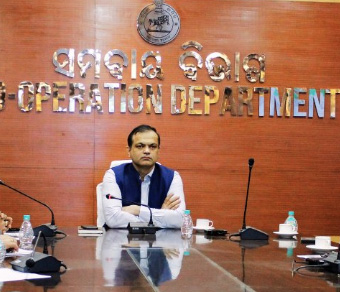Bhubaneswar: The State Government has asked all Divisional Deputy Registrars of Cooperative Societies (DRCS) to identify eligible Primary Agricultural Credit Societies (PACS) for creation of various agri infrastructure under the ‘World’s Largest Grain Storage Plan in Cooperative Sector’ project.
Arvind Agarwal, Secretary Co-operation has discussed the issue with the officials of the Department of Co-operation.
According to officials, Baisinga LAMPCS in Mayurbhanj district has been selected in consultation with NABARD for execution of the project on ‘Pilot Project’ basis. Apart from this LAMPCS, one viable PACS in each district will be identified for the next phase on Pilot basis.
Further, the district level cooperative officials have been asked to take steps for establishment of at least five new multipurpose PACS per district to cover all Panchayats. These multipurpose PACS will also undertake diary and fishery activities as per their requirement and viability, the officials said.
In the meanwhile, the Ministry of Cooperation has also relaxed the norms for construction of agri-infrastructures under the scheme.
“There is no mandatory requirement of one acre of land availability for construction of agri-infrastructure, including godowns, at PACS level under the pilot project of the World’s Largest Grain Storage Plan in the Cooperative Sector. The land requirement may vary from as per the capacity of godown and components chosen by PACS under the project,” the Ministry of Cooperative said in a letter the Secretary of the Department of Co-operation
To execute the project, the National Cooperative Development Corporation (NCDC), the implementing agency, has recently signed an MoU with NABARD Consultancy Services (NABCONS), Central Warehousing Corporation (CWC), Food Corporation of India (FCI), etc. and implementing the Pilot Project in 24 PACS of 24 different States/ UTs. Construction has started at five PACS, one each in the States of Tripura, Haryana, Tamil Nadu, Uttar Pradesh and Madhya Pradesh. Detailed Project Reports are under preparation for the remaining PACS.
Moreover, the NCDC has also on-boarded National Buildings Construction Corporation Ltd (NBCC) for providing project management consultancy services.
In order to scale up the project, the Ministry had asked the States to identify at least five PACS from each district having shortage of food grain storage capacity. So far, more than 1400 PACS have been identified by States and UTs and NAFED for participation in the project, sources said.
The creation of decentralized storage capacity ranging from 500 MT to 2000 MT at PACS level would reduce food grain wastage by creating sufficient storage capacity, strengthen food security of the country, prevent distress sale of crops and enable farmers to realise better prices for their crops. Since PACS would be operating as a procurement centre as well as Fair Price Shops (FPS), the cost incurred in transportation of food grains to procurement centres and again transporting the stocks back from warehouses to FPS would also be saved.
The estimated cost of the project for each PACS would vary and depend upon various parameters such as storage capacity, requirement for custom hiring centre, processing units, etc. Interest Subvention under the Agriculture Infrastructure Fund would be dovetailed with the subsidies available under the identified schemes for the construction of godowns and other agri-infrastructure at PACS level.


